Work can do more than dampen your spirits -- it can make you physically sick.
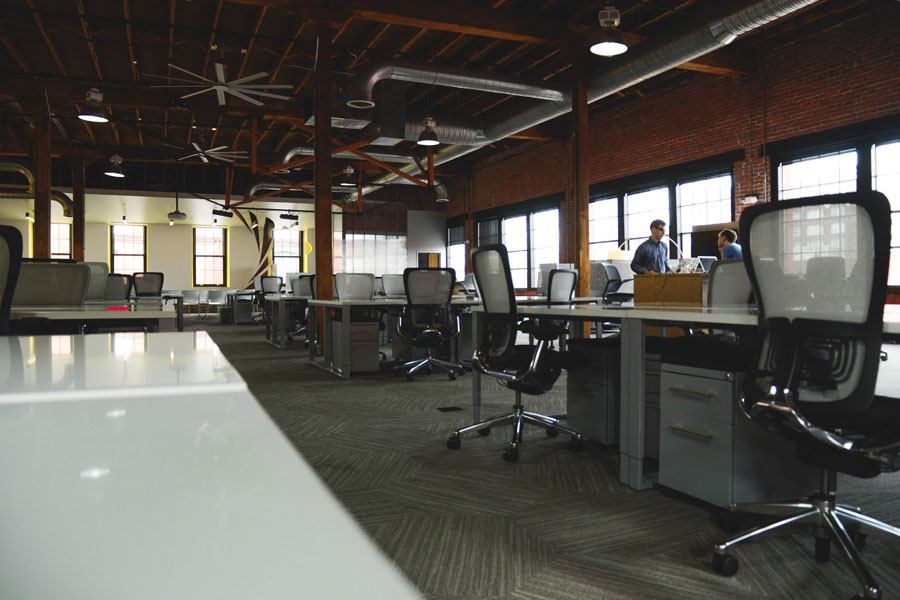
Pexels
While the daily drudgeries of office life are enough to make anyone a bit soul sick, sometimes the workplace can actually make you physically ill. It’s aptly called “sick building syndrome,” and it can directly affect your productivity. Here are six ways that our office buildings are slowly damaging our health and sanity.
Lighting

Oimax/Flickr
You know you’re in an office when you hear the quiet, crushing drone of fluorescent lights. As it turns out, they don’t just look horrible, they make us tired by messing up our circadian rhythm.
New research published in Behavioral Neuroscience indicates that without sunshine, workers are “significantly sleepier” in the late afternoon than those who are able to soak up some sun during the day.
That helps explains the 3 p.m. slump — and why in-office headaches are easier to come by than a decent cup of coffee. Indeed, artificial light exposure brings with it eye strain, dull headaches – even migraines.
It’s even worse for those who can spot the fact that fluorescent lights are always flickering; as a consequence, these sight-sensitive individuals can experience anxiety on top of eye strain and sleepiness.
What can be done?
It might be a tough sell to ask your boss to replace fluorescent lighting with incandescent bulbs or put in more windows, which is why you should focus on the benefits.
And there are a ton of them: One case study of a Reno, Nevada post office shows that a lighting system renovation yielded an immediate and striking increase in worker productivity — $500,000 per year kind of productivity.
Alternatives to lighting replacement include waking up earlier to get some pre-work sunshine, or taking your breaks outdoors – weather permitting.
Temperature
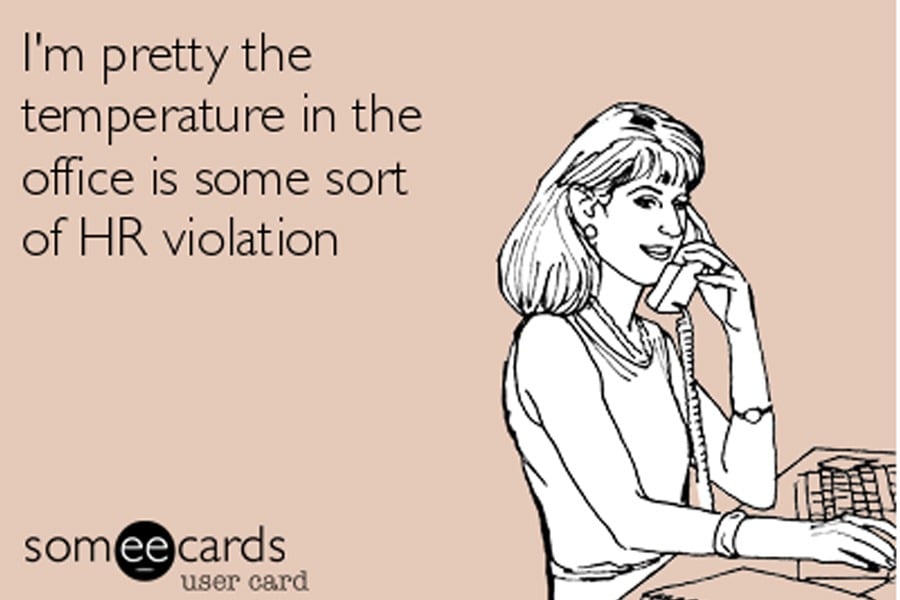
Jordan Meredith/some ecards
Fights over the office temperature have likely occurred since the invention of the thermostat — and women tend to get the short end of the stick. This, scientists say, is likely because the decades-old formula used to calculate optimal office temperature is based on men’s metabolic rates, which means that women are often left shivering.
Differences in the physiology of the sexes aside, an International Journal of Epidemiology study has linked an increase in the use of air conditioning to difficulty breathing, irritated skin, headache, and fatigue.
This research also compares the health of those who work in air conditioning to those who don’t – and finds a larger number of people with these symptoms work in air conditioned environments. The study found that those who work in air-conditioned offices also missed more work days due to illness.
While a number of variables can explain the difference between these groups’ health, what isn’t up for debate is how air conditioners’ very functioning exposes us to pollutants. According to the Environmental Protection Agency (EPA), because cooled air from an AC unit recirculates, it exposes us to more pollutants.
Mold, dander, and other irritants continually swirl around the office, making those who are allergic miserable. And as with everything, discomfort equals distraction, so productivity plummets when workers are too cold – or too hot.
What can be done?
Try cracking a window and see if anyone notices. Suggest cleaning the carpets and curtains (if your office has them) to decrease the allergens that live there.
The Break Room
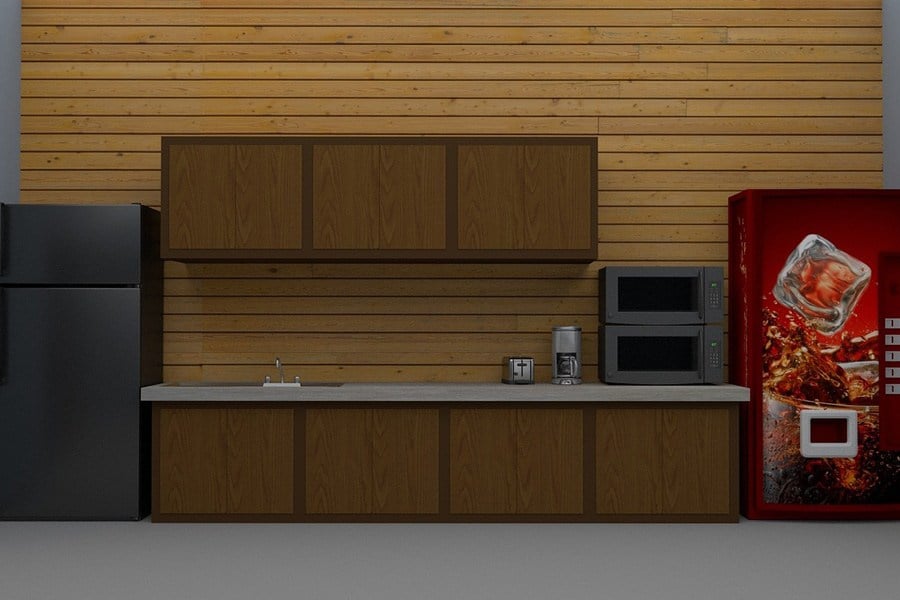
Pixabay
If allergens like mold don’t affect you, wait until you hear what’s lurking in the break room.
In a six-month study thought to be the most comprehensive of its kind, personal care company Kimberly Clark collected 5,000 swabs from office buildings to test them for germs. It found that kitchens and break rooms have just as many germs as restrooms, if not more.
“A lot of people are aware of the risk of germs in the restroom, but areas like break rooms have not received the same degree of attention,” microbiology professor Charles Gerba said in the Kimberly-Clark news release. “This study demonstrates that contamination can be spread throughout the workplace when office workers heat up lunch, make coffee or simply type on their keyboards.”
In this particular study, researchers placed sample viruses on one or two surfaces, and then tested 60 to 100 surfaces in the office buildings periodically during the day. They found that about half of the surfaces tested were contaminated with the sample virus within a few hours.
What can be done?
Researchers found that using EPA-approved disinfecting wipes on surfaces in the office reduced the sample virus (which behaved similar to a standard flu virus) 80 to 99 percent. This, along with proper hand-washing and restroom hygiene, can greatly reduce sick building syndrome.
The Furniture
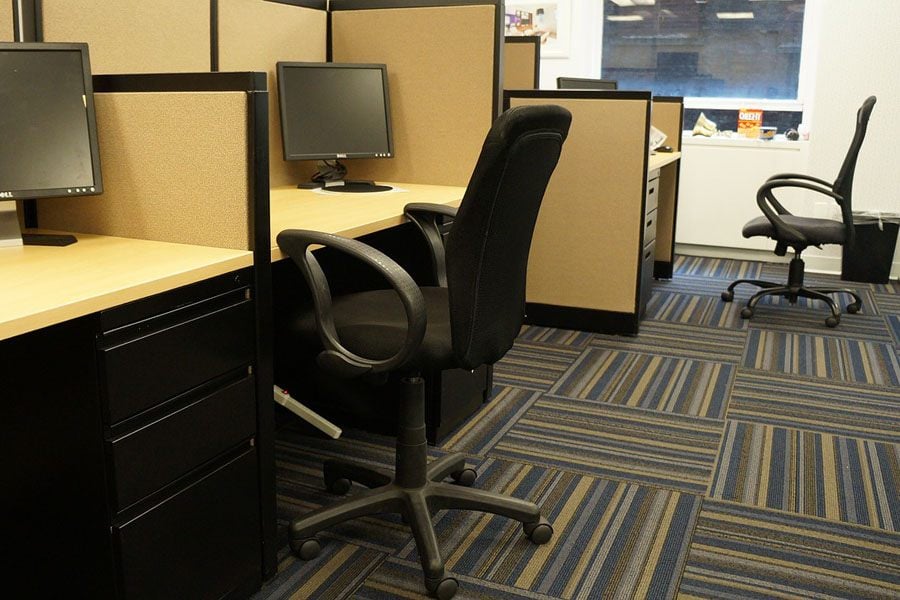
Pixabay
Bad news, desk sitters: A Journal of the American Medical Association study found that if you’re more than 45 years old and sit for more than 11 hours a day, you have a 40 percent greater chance of dying in the next three years.
While terrifying enough in its own right, that statistic is easily misunderstood. It doesn’t mean that there is a 40 percent chance that you will die – but it does mean you should probably try to move more and sit less.
If you’re already at risk for type 2 diabetes, research published in Diabetologia Journal suggests that the amount of time spent sitting vs. standing plays a more important role in acquiring diabetes than actual exercise.
One way to counteract this — along with the risk of obesity, cardiovascular disease and cancer — is by purchasing a standing desk. Just make sure it doesn’t contain toxic glue or formaldehyde-filled wood, as inhaling them may make you quite ill.
What can be done?
If a standing desk is a no-go, set an alarm on your phone to take a “walk break” every half hour. Become fidgety; pace while taking phone calls and move your legs around under your desk. Drink lots of water; you’ll have the benefit of hydration and be forced to walk — to the restroom, anyway.
The Layout
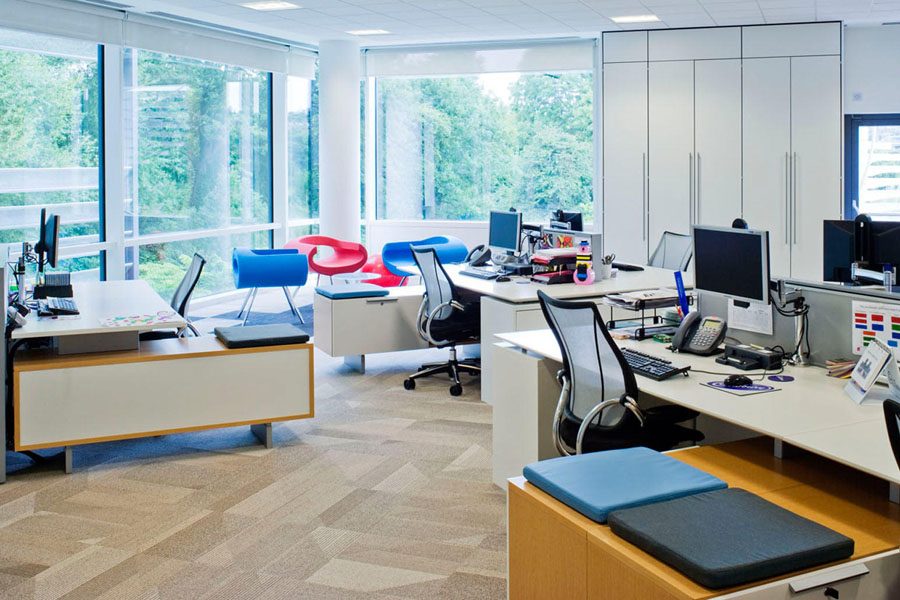
K2 Space/Flickr
Open concept work spaces seem to have overtaken the idea of a “private office,” offering employees a chance to interact more easily with one another — and share germs.
An Ergonomics Journal study confirms what you might already expect: Germs travel more easily in confined spaces.
When you add more people to said confined space, the likelihood of sharing these germs grows. Indeed, the study found that those who shared a workspace with for other employees or more took more sick leave than those who did not.
If it’s not the germs that get you, it could be the stress. An open office layout has been shown to elicit feelings of helplessness and loss of control over your environment. This Journal of Environmental Psychology study found that an inability to control certain factors in the office — like how things look, the temperature, the lighting, or even how to conduct meetings — caused morale to fall and stress to creep in.
While people say they feel trapped or isolated in cubicles, they do offer privacy — which has been University of Tennessee researchers have shown increases job performance. The open office might look trendy, but perhaps it’s time to focus on making cubicles cool again.
What can be done?
Some furniture makers are now applying anti-germ technology to furnishings made for open office layouts.
For instance, the company Steelcase uses silver ion on frequently touched desk surfaces, such as adjustment levers. Silver ion is shown to kill some bacteria, making it potentially useful in reducing a given virus’ spread.
Short of redecorating, this is where hygiene comes into play yet again; hand-washing and using EPA-approved disinfectants are the best way to gain an upper hand against sickness.
Noise
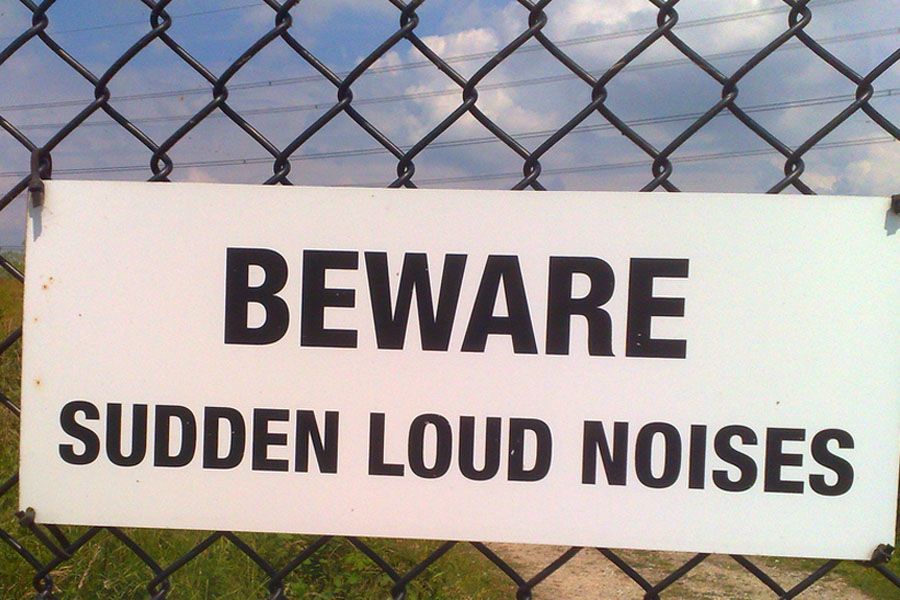
STML/Flickr
Noise poses a problem in most offices – especially the open concept ones. A Noise & Health study has shown that excessive commotion impairs our memory and our math skills, and decreases our mental acuity.
And if you think listening to music or the radio helps cover the droning noise of office chit chat or machinery, think again – it just adds to the mix, further impairing mental sharpness.
Noisy offices can also affect you on a purely physiological level. A Cornell University study found that after only three hours in an open office, adrenaline (or epinephrine) rose in its occupants, causing a drop in both creativity and motivation.
A UCLA Health Impact Assessment adds that if the office is really noisy, it can cause hearing loss, high blood pressure, sleep disruption, and even harm your cardiovascular system.
The Center for Hearing and Communication warns that any noise over 85 decibels can cause hearing loss over time. For comparison’s sake, the dull roar of a large office is 50 decibels; commuting via subway puts you in a station that likely measures 90-115 decibels — even a coffee grinder emits 70-80 decibels of noise. All these things add up during the day and can have a detrimental impact on your health.
What can be done?
Using sound-absorbing materials such as deflectors or sound barriers will cut down on the noise that reaches your ears.
If you’re unlucky enough to sit next to a loud co-worker or obnoxious printer – speak up! Maybe your boss can move you to a different area. If all else fails wear a pair of over-the-ear, sound blocking headphones when appropriate.
Don’t let sick building syndrome make your work life miserable.
Next, learn if your boss is a psychopath and read more about recent news on why your office is rotting your brain.





